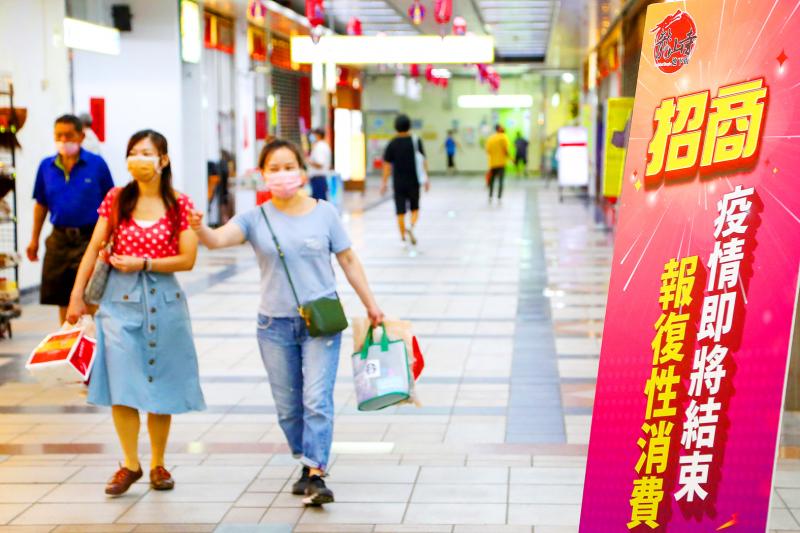The nation is opening its doors to two additional categories of foreign students for the fall semester, the Ministry of Education (MOE) said yesterday.
Taiwan first reopened its borders to foreign students in August last year and allows students who fall in one of four categories to enter the nation.
The two new categories are “exchange students who are enrolled in a Taiwanese school through an education cooperation agreement signed with a foreign school” and “students [including Hong Kong and Macau residents] who are enrolled in Mandarin-language programs that last two months or longer.”

Photo: CNA
The former would be allowed to enter Taiwan from Aug. 1, while the latter have been allowed entry since Friday, the ministry said.
The students would be subject to the “3+4” quarantine policy upon arrival in Taiwan: three days of home quarantine followed by four days of disease self-prevention, it said.
They can quarantine at a hotel or at their dormitories after obtaining the approval of the local health department, it added.
Students at universities without quarantine facilities can contact the ministry to find accommodation at a centralized quarantine facility, it said.
The ministry would continue to conduct rolling reviews of the foreign student entry program, based on the Central Epidemic Command Center’s (CECC) COVID-19 regulations, it added.
Separately, Centers for Disease Control (CDC) Deputy Director-General Chuang Jen-hsiang (莊人祥), who is the CECC’s spokesman, said 25,251 local and 45 imported COVID-19 cases were reported yesterday, as well as 73 deaths.
The new local caseload is down about 10 percent from Saturday last week, he said.
Of the deceased, 47 people (65 percent) were aged 80 or older, 65 (90 percent) had cancer or other underlying health conditions and 52 (72 percent) had not received a booster vaccine, he said.
The youngest of the deceased was a woman in her 40s who was unvaccinated. She died of pneumonia and respiratory failure on Wednesday, the same day she was diagnosed with COVID-19.
Taiwan has reported 4,184,399 local cases so far this year, he said. Of those, 19,055 were moderate-to-severe cases, including 7,520 deaths Chuang said, adding that 99.55 percent of all cases were asymptomatic or mild.
The CECC on Friday reported the nation’s first community case of the Omicron BA.5 subvariant of SARS-CoV-2 — a woman in her 20s who did not travel to other countries in the past six months.
Five close contacts of the woman tested negative in polymerase chain reaction (PCR) tests, Chuang said yesterday.
Her mother is suspected of being the infection source and the local health department has identified seven of the mother’s colleagues for PCR testing, he said.
Six of the colleagues were asymptomatic, while one had symptoms and previously had COVID-19, Chuang said, adding that their test results have yet to come.
He said 56,778 doses of COVID-19 vaccines were administered on Friday, bringing the nation’s first, second and booster dose vaccination rates to 91.43 percent, 85.43 percent and 70.84 percent respectively.

US President Donald Trump yesterday announced sweeping "reciprocal tariffs" on US trading partners, including a 32 percent tax on goods from Taiwan that is set to take effect on Wednesday. At a Rose Garden event, Trump declared a 10 percent baseline tax on imports from all countries, with the White House saying it would take effect on Saturday. Countries with larger trade surpluses with the US would face higher duties beginning on Wednesday, including Taiwan (32 percent), China (34 percent), Japan (24 percent), South Korea (25 percent), Vietnam (46 percent) and Thailand (36 percent). Canada and Mexico, the two largest US trading

China's military today said it began joint army, navy and rocket force exercises around Taiwan to "serve as a stern warning and powerful deterrent against Taiwanese independence," calling President William Lai (賴清德) a "parasite." The exercises come after Lai called Beijing a "foreign hostile force" last month. More than 10 Chinese military ships approached close to Taiwan's 24 nautical mile (44.4km) contiguous zone this morning and Taiwan sent its own warships to respond, two senior Taiwanese officials said. Taiwan has not yet detected any live fire by the Chinese military so far, one of the officials said. The drills took place after US Secretary

CHIP EXCEPTION: An official said that an exception for Taiwanese semiconductors would have a limited effect, as most are packaged in third nations before being sold The Executive Yuan yesterday decried US President Donald Trump’s 32 percent tariff on Taiwanese goods announced hours earlier as “unfair,” saying it would lodge a representation with Washington. The Cabinet in a statement described the pledged US tariffs, expected to take effect on Wednesday next week, as “deeply unreasonable” and “highly regrettable.” Cabinet spokeswoman Michelle Lee (李慧芝) said that the government would “lodge a solemn representation” with the US Trade Representative and continue negotiating with Washington to “ensure the interests of our nation and industries.” Trump at a news conference in Washington on Wednesday announced a 10 percent baseline tariff on most goods

THUGGISH BEHAVIOR: Encouraging people to report independence supporters is another intimidation tactic that threatens cross-strait peace, the state department said China setting up an online system for reporting “Taiwanese independence” advocates is an “irresponsible and reprehensible” act, a US government spokesperson said on Friday. “China’s call for private individuals to report on alleged ‘persecution or suppression’ by supposed ‘Taiwan independence henchmen and accomplices’ is irresponsible and reprehensible,” an unnamed US Department of State spokesperson told the Central News Agency in an e-mail. The move is part of Beijing’s “intimidation campaign” against Taiwan and its supporters, and is “threatening free speech around the world, destabilizing the Indo-Pacific region, and deliberately eroding the cross-strait status quo,” the spokesperson said. The Chinese Communist Party’s “threats